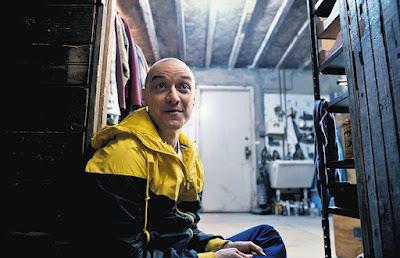Format: DVD from Sycamore Public Library on basement television.

There was a period of three or four years when I collected comics. It started when I had a couple of college roommates who were active collectors and ended about six months after I got married and needed to start saving money to buy a house. Suddenly, $30-$40 per week no longer made sense. I say this because during that time, one of my favorite series was called The Badger. It featured a superhero who also had about eight distinct personalities, one of which was a world-class martial artist who went toe-to-toe with demons, aliens, and more. I say this because it’s relevant when looking at Split from a few years ago.
I don’t know if it’s unique in movies, but Split is a sort of parallel film with Unbreakable. What I mean is that the film Glass is a direct sequel to both Unbreakable and Split. This odd trilogy is an exploration by M. Night Shyamalan (who I tend to call M. Night Shame-about-your-last-film) into the idea of superheroes and the supernatural. At least that’s what I presume it’s about; I haven’t seen Glass.
We open at a birthday party. Claire (Haley Lu Richardson), her father (Sebastian Arcelus), and Marcia (Jessica Sula) are preparing to leave while the outcast invited simply because she had to be Casey (Anya Taylor-Joy, and as a young child by Izzie Leigh Coffey) waits for the bus. Claire’s father insists on driving her home. This never happens, though—he is knocked unconscious off-screen and the three girls are abducted by a man named Dennis (James McAvoy).
What we’re going to piece together over the next bit of film is that the three girls have been abducted for a reason unknown to us. Dennis, while the abductor and potential pedophile, is not the only person responsible for what is happening. Dennis is one personality in the body of a man named Kevin Wendell Crumb. Dennis, another personality named Patricia, and the personality of a young boy named Hedwig give a little insight into what might be happening, but not enough to really know. All we know is that if any of the girls make a mistake, they are separated from the others and kept in solitary.
While all of this is happening, we are introduced to another personality, Barry. Barry has been contacting Dr. Karen Fletcher (Betty Buckley), a psychiatrist who has been studying Kevin and his personalities. We are told that there are 23 personalities living inside Kevin’s brain, but Barry lets us know that there appears to be a 24th ready to emerge.
That 24th personality is known by the others as “The Beast.” And this is where we’re really going to encounter the question that Split wants to ask. The initial question is whether or not you accept the reality of Dissociative Identity Disorder. If you accept that, the movie asks that you accept the idea that those different personalities have actually physically different presences in the real world. So, when one personality is active, it can have not just a different appearance, but actually different physiology. One personality, for instance, might be diabetic and require insulin while the others do not, or one might require glasses while the others don’t.
That’s a big ask, certainly. But if you accept that, the film asks it’s third and most difficult question. If one of the personalities is perceived to have supernatural abilities, does it? This is not asked in the hypothetical. Essentially, if a personality is seen as being (for instance) bulletproof, is it actually bulletproof? Can a personality that is conceived of as being able to fly actually fly? It’s a fun question for a movie, and Split naturally answers it in the affirmative, but does so in the most ordinary way possible. It’s a disappointment when that last personality finally shows up.
The best think about Split is not seeing Anya Taylor-Joy at this early stage in her career, but the performance of James McAvoy. As disappointing as the entire movie is, McAvoy’s performance is the largest bright spot and the reason to watch the film. While we aren’t going to see all 23 personalities, we are going to see more than half a dozen, with four or five of them being fairly prominent. The trick needed to make this work is McAvoy needing to be flexible enough to change voices, physical presence, and attitude to make each personality believable, and to do so sometimes several times in the same shot. And he pulls it off. It’s a masterclass in character and acting.
The issue is that this performance has been given in the service of a movie that asks a really interesting question and then answers it in the most pedestrian way that it can. I enjoyed Unbreakable well enough, and Split is worth seeing specifically for McAvoy. I don’t know if it’s enough to get me to watch Glass.
Why to watch Split: James McAvoy kills it, no pun intended.
Why not to watch: The reveal is disappointing, and the premise is more interesting than the execution.
